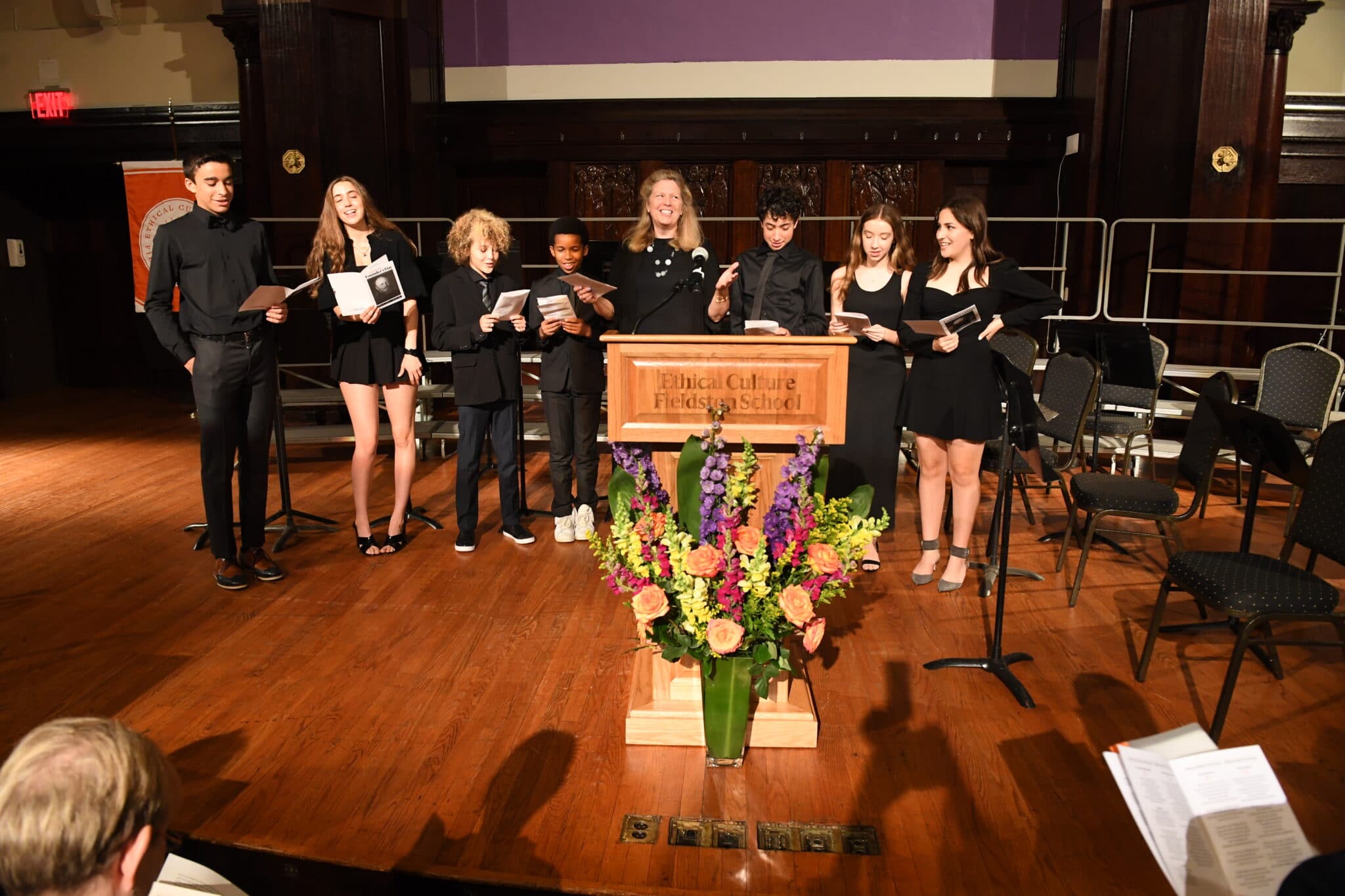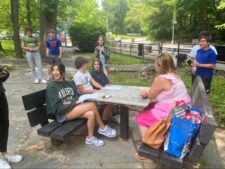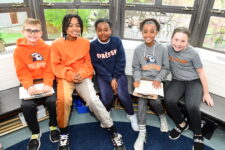For 30 years, Tom Christensen, Music Teacher and Music Department Chair, has been inspiring a love of music in his students at Fieldston. After applying to a listing in “The New York Times” careers and education section for a part-time music teacher position, Christensen visited the Fieldston campus for his interview and was surprised at what he found. “I grew up in the suburban public school system in California and this environment — I didn’t even know this kind of school existed.” His part-time role grew to full-time, and in 2004, he became the chair of the music department. “I’ve been the Fieldston Upper jazz band director and woodwind teacher, taught in City Semester and for interdisciplinary courses in history, and been an active part of Fieldston Middle band classes,” he says, although his primary job is leading the jazz band.
For Christensen, the jazz program was one of the things that drew him to the School. Dating back to the early 1970s, it was one of the first established high school jazz programs in the country and there are currently seven jazz bands across Fieldston Middle and Upper — but it’s the breadth of the music programs offered that Christensen says is what makes the School special. “We put on an opera each year, there are choruses and chamber music, classes in film scoring and music appreciation, percussion ensembles, electronic music — you just don’t find this kind of music program, even at other private schools.”

That kind of expansive programming — with 700 students coming through the department each week — keeps the music faculty of eight teachers busy. Christensen says that he’s worked to hire people who are not only passionate about music, but who also have a clear vision of how they want to run their programs. Many of those teachers have been at ECFS for over 20 years, including Russell Currie, Kathleen Hayes, and Scott Latzky, while others, like Eric Gilley, John Lowery, Jonathan Faiman, and Gizen Yucel, are newer to the School.
No matter their tenure, the music faculty brings a wealth of experience, a dedication to creativity, and a commitment to challenging their students. This may come in the form of an opera production led by Hayes; string quartets played by the Manhattan String Quartet that were composed by students in Currie’s composition class; or learning from Latzky about his recent sabbatical studying drumming in Ghana, Morocco, and South Africa. The newer faculty members have invigorated their programs with fresh points of view, such as Yucel’s experience in professional orchestras around the world and Gilley’s time spent as one of 10 band directors at a program in Texas with an 800 member marching band. For many students, learning from teachers with passion and vision is what inspires them to pursue their own career in the music industry.

Over the years, Christensen has seen many students go on to find success in music after they graduate. “For so many students, music is what drove their experience at Fieldston. When I have students who are considering a career in music, I try to give them a realistic view of what it means to play as an adult and a professional. Ultimately, if music is something they love, they’re going to do it — no matter what.”
We spoke to five ECFS alumni about their experiences at Fieldston, how they began their careers in music, and what advice they’d give to current students who want to follow in their footsteps.
Marissa Arciola ’99 is a double bassist who worked at the New York City Opera and Brooklyn Philharmonic before moving to the for-profit world. Arciola performs across the country with different groups and in different genres. Whether with the Bermuda Symphony, the 90s Grunge Cover band No Alternative, or her nonprofit the Syrian Music Preservation Initiative, music is an important part of her life.
Myles Cameron ’15 is a singer-songwriter who has released four musical projects over the past five years, amassing over 20 million streams and a budding fanbase. He draws inspiration from his suburban upbringing as well as Black writers and thinkers such as Maya Angelou, Zora Neale Hurston, and James Baldwin. Myles graduated from Yale University in 2019 and is currently working on his debut album.
Dan Knobler ’07 is a Grammy-nominated producer, recording engineer, mixer, and guitarist. He has produced albums for Allison Russell, Lake Street Dive, Rodney Crowell, Erin Rae, Caroline Spence, The Stray Birds, Michaela Anne, Becky Warren, EMEFE, Faux Ferocious, and more. Records he produced have been featured by “The New York Times,” NPR, “Rolling Stone,” “Billboard,” and on Barack Obama’s “Best of 2021” playlist.
Andrew Marshall ’09 is an LA-based tour and studio drummer. Since 2018 he has been working with Billie Eilish and FINNEAS, with whom he has toured around the world, playing at festivals like Bonnaroo, Lollapalooza, Coachella, and Glastonbury. He has also appeared with them on TV shows including Saturday Night Live, American Idol, and Fallon, as well as at the Grammy Awards and the Oscars. In between tours, he records drum tracks remotely for artists and producers from his home studio.
Keith Witty ’95 is a bassist, composer, and producer who has performed and recorded worldwide with artists across musical styles, including Somi, Amel Larrieux, and David S. Ware. Witty has collaborated with schools and community arts programs as an artist-in-residence and served as composer-in-residence for the New York City Opera’s education program for 10 years. He currently teaches at Blue School in lower Manhattan and is a frequent visiting ensemble coach at Juilliard.
What role did music play in your experience at Fieldston?
Arciola: Music was a huge part of my life at Fieldston. I still have the recorder that I learned to play in 1st Grade! I played violin in lower school, participated in the orchestra and the chorus in Fieldston Upper, and started learning upright bass when I was 15. I joined the jazz band as well, which ended up being one of the biggest influences on the rest of my life.
Knobler: Music was central to my life at Fieldston, and the music program always felt like a special community within the School. Tom Christensen encouraged me to play and study as many instruments as I was interested in and as a result, by my senior year, I was playing guitar in the top jazz combo, drums in the jazz big band, percussion in the orchestra and percussion ensemble, and tenor saxophone in another jazz combo. Every teacher I encountered in my time at Fieldston understood how seriously music factored into my life and did their best to encourage me and open every possible door for more opportunities to study and play.
Cameron: I was in the chorus all throughout my high school years (shoutout to Dr. Hayes!) and frequented the digital music room where I took a couple classes with Mr. Currie. I started writing my own songs around 10th Grade, so I spent a lot of time in the practice rooms showing ideas to my friends, and I got to perform some of the songs that I wrote at assemblies and coffee houses.
Marshall: I was obsessed with music and completely filled every spare minute of my schedule with music classes and extracurriculars. Jazz combo, big band, percussion ensemble, electronic music, playing in the pit orchestras for Fieldston’s musical theatre productions, rehearsing and gigging in student bands outside of school — there was no shortage of musical adventures and I took full advantage of them.
Witty: Music was the center of my universe at Fieldston. I transformed from a guitarist to a double bassist over the course of my sophomore year and had the great fortune of having two serious and accomplished jazz musicians in my class — Neil Schwartz ’95 was a fabulous young drummer who felt and understood the rhythms of jazz in a way that was both raw and joyful and Matt Cohler ’95 was a prodigious tenor saxophonist who was as much our teacher as he was our bandleader. The three of us were music majors beginning our sophomore year and we played together as often as possible. Free periods were shredding sessions — it was what we did for fun.

Is there a particularly impactful or meaningful memory, class, or teacher you had during your time at the School?
Witty: In my sophomore year, Tom Christensen sent me downstairs to an instrument closet that I didn’t know existed to get another bass amp. When I entered the closet, I saw three double basses sitting on a rack. I pulled one down and tried to play a few notes, then I played a few more, and suddenly 10 minutes had disappeared. Instead of bringing a bass amp back up to class, I brought a double bass. Tom warned me that it was a difficult instrument to play and I had a huge blood blister by the end of that week, but the frequencies and sonorities of the instrument had taken hold of me.
A couple years later, Tom thought it would be fun to create a jazz club atmosphere for an evening concert at Fieldston. Tom decided to join the trio for a song and we played “Congeniality” by Ornette Coleman, a composition with a tightly orchestrated melody that spills into free improvisation. I experienced a level of musical invigoration and a spiritual conjoining with my fellow musicians that was irresistible, and I caught some of the expressions on the faces of my teachers and friends who were there. It wasn’t that they were impressed — they were moved. Though I didn’t admit it to myself for a few more years, after that performance I think my course was pretty much set.
Marshall: I’m grateful to all the music teachers I had at Fieldston for introducing me to new styles of music, pushing me to improve, and expanding my musical world. I particularly enjoyed learning about Brazilian samba music and getting to play in and lead the percussion ensemble in a Brazilian carnival-style performance at Homecoming all four years of high school.
Cameron: I have a distinct memory of recording vocals for an EDM song called “Ignite” with Zaj Vidal-Burgie in the digital music room. You might still be able to find it on Soundcloud.

Knobler: I remember with great fondness my time in all the different jazz bands/classes led by Tom Christensen, which — before the arts facilities were renovated around 2007 — were taught in classrooms tucked away above one of the old gymnasiums. Tom fostered such a special sense of community up there and even the students who didn’t have a primary passion for music took pride in being in the jazz band. Tom walked that beautiful line of commanding respect and attention, while also allowing room to treat us like fellow musicians working together to make something greater than the sum of our parts. It was a formative experience and I learned a lot about being a bandleader from the way Tom ran those classes.
Arciola: I loved so many of the classes that were offered. There were lots of things that were special and unusual, like Dr. Chuckrow’s unofficial class on musical tuning, which I took with Jesse Schotter ’99 and Seth Goldman ’99 at 8:00am one semester of our senior year. We had the freedom to explore topics that were of interest to us in and outside of the classroom.
Tom Christensen definitely changed the course of my life. He was the one who encouraged me to join the jazz band, he took me with the rest of the jazz groups to the jazz festival where I won a scholarship for a summer music program, and he is the one who encouraged me to apply to Eastman for college, even though I didn’t think I was good enough. I ended up getting into Eastman where I dedicated the next four years of my life to music. If it were not for his encouragement, music would have remained an important part of my life — but it wouldn’t have been the driving factor of my career, free time, and social life.
After you graduated, how did you make your way into the professional music world?
Arciola: After Fieldston, I wanted a more stable life than what I feared a music performance career could afford me. I ended up entering a business-focused masters program that changed my career trajectory. I continue to play professionally in New York City and across the country, primarily with the nonprofit that I run with my partner, but with my masters degree, I started focusing on the business side of the music world. By working in marketing for New York City Opera, Brooklyn Philharmonic, and then with American Express’s Entertainment Access program and SiriusXM, I’m able to keep music close to me, even when I’m not performing.

Knobler: After graduation, I went to the Clive Davis Department of Recorded Music — a multidisciplinary music and recording program at NYU/Tisch. During my time there I focused on music production and engineering, continued to play gigs around New York as well as sessions for my friends and fellow students, and started an audio and video production company with the headquarters and recording studio in a multi-unit home in Brooklyn. We gained visibility doing live performance videos with large ensembles in non-traditional spaces, which led to us working with Feist and being included in “Fast Company” as one of the “Most Innovative Companies of 2012.” Since leaving the company after a few years, I’ve been working steadily as a producer, engineer, mixer, and guitarist. A record I produced, Outside Child by Allison Russell, was nominated for three Grammys this past year and garnered critical praise from a plethora of outlets including “The New York Times”, where it was listed as the second best album of 2021.
Cameron: For me, it started while I was still at Fieldston. I started writing songs when I was 14 years old, some of which were produced by other Fieldston students, and I would post them on Soundcloud. Over the years, that Soundcloud account led me to meet other producers and collaborators who I would go on to make music with throughout my college years. Eventually I started posting my music to Spotify and Apple Music, and some of those songs really started to gain traction. It’s always been the same journey, I’m just a little further along now. Sometimes it feels like things are going really well and flowing naturally, and sometimes it feels like I’m still figuring it out. I’m excited to see where the journey leads next. I have a good feeling about the next few years.
Marshall: When I moved back to New York after college, I had the singular goal of making a living as a musician. I tried to meet as many other musicians as I could by hanging out at shows and jam sessions, and I would browse forums online where people would post auditions for drummers. As I started getting called to play gigs around town, I would be sure to put my best foot forward: showing up punctually, knowing the music, playing well and in a way that supported the music — not my own ego. I also kept myself open to any style or type of gig that I felt I could musically handle. Word spread, and I would often meet someone on a gig who would connect me to the next one. Eventually, one of those connections led to an audition for Billie Eilish and to where I am now.
Witty: When I graduated from Wesleyan and moved back into my mom’s apartment in New York City, the jazz world seemed so intimidating with so much enormous talent that my arms stopped working. It felt like I had terrible tendonitis, but it was in fact the physical manifestation of fear and bewilderment. I took a part time job at an after school media arts program for adolescents in Harlem and started building relationships with musicians little by little, playing any and every gig I could for whatever it happened to pay. It was unforgiving and unstable, but it was a vivacious and creative time of life. I started quilting together myriad different playing, teaching, and producing opportunities, making my living entirely via music for over 15 years until I accepted a teaching job just before the pandemic.
How do you see Fieldston’s education impacting your current career?
Arciola: Fieldston encourages students to explore and question in ways that have helped me along the way in my career. Plus, I ended up with strong friendships which I keep to this day!
Knobler: Fieldston encouraged an open-minded and holistic approach to examining the world. I’m grateful for all of the ways my education encouraged me to see all sides of an issue, to sympathize with and champion marginalized communities while understanding the structural ways those communities came to be marginalized in the first place, and to discuss and analyze history and literature from a multitude of view points. I cherish the roles that important and influential teachers played in my life. In addition to being extraordinary teachers — the kind whose impact spans generations of students and stays with all of them for life — they also provided a map for how to be a good leader and mentor, how to treat everyone with kindness, and how to create power structures with open lines of communication and mutual lanes of respect.
Cameron: The core of what I do now — songwriting and recording — is writing and I think of myself as a writer before anything else. Fieldston was definitely a place where I started to hone that skill, both in songs and in essays for English class. Access to top tier production and recording equipment at that age was also really amazing.
Marshall: I truly can’t overstate Fieldston’s impact on my career. Many of my initial contacts in the music business were friends I made at Fieldston, or friends of friends. In fact, the way I got in touch with Billie Eilish’s team in the first place was through a chain of connections that originated with people I met at Fieldston. I’m so grateful for the music education I got at Fieldston and for showing me what a vibrant arts community looks like. The countless hours I got to spend playing my instrument inside and outside of the classroom were invaluable, and I improved exponentially as a musician during my four years at Fieldston through exposure to many different kinds of music and playing situations. I think my life would look very different today had I not been lucky enough to attend the School.

Witty: A Fieldston education was structured like pre-university for those who had a strong sense of their direction, especially in the arts. While it gave students the freedom to follow a more traditional academic path, those of us who wanted to could plunge head first into our artistic pursuits. It felt like we were young artists in fertile ground that fostered our growth and wanted us to bloom. And the whole community — teachers and students alike — saw us doing our thing, cheered us on, and cleared a path. It is impossible to build a life in the arts without a basis of love and devotion to your practice and craft. Fieldston provided the space and environment to develop all of that.
What advice would you give to Fieldston students or alumni who want to pursue a career in the arts?
Arciola: There are so many possible paths with a career in the arts — the obvious paths of artist, actor, or musician, but beyond that, one can have an incredibly fulfilling life working near the arts. That’s what I have done. I think that if you are interested in a career in the arts, your path is unlikely to be straight, but it will likely be very interesting!
Knobler: Just start making whatever it is you want to make. Pursue your own ideas in whatever format to whatever degree you can. Help your friends with their projects and ask them to help with yours, or find the teachers, friends, and mentors who will give you their honest perspective and constructive criticism and be open to receive that criticism. Engage with all types of art — you can learn about making music from a painting, you can learn about hip hop from listening to jazz, and you can become a better poet by watching ballet.
Cameron: Don’t expect it to be easy. There’s an incredible amount of patience and willpower you need to have, and the biggest lesson that I’ve been learning right now is having faith. In every artist’s journey, there are times where things aren’t happening exactly how you’d like or where the things you want to achieve feel impossibly far away, and you have to trust in your love and passion for what you do. Have faith in that, have faith in yourself, and have faith in the universe. Everyone who has achieved something remarkable believed it was possible before anyone else did.
Marshall: I would say only one thing: DO IT! Our society sometimes has a way of making artists and musicians feel as though their pursuits are not worthy or that they should go get a “real job.” I can’t imagine doing anything other than playing music, and I’m endlessly grateful that I was supported by those around me in the decision to follow my dream. Art is absolutely worth pursuing, and it is just as noble a vocation as anything else. If you’re called to it, don’t be afraid to devote yourself fully — work hard, practice your instrument, go to a conservatory if you want, do whatever you have to do to be the best you can be. Pursuing a career in the arts can sometimes be a tough road to walk, but it’s infinitely better than the regret of never trying to walk it at all.
Witty: Art makes wonderful hobbies, but hard-scrabble careers. If you can do something else and be happy, do that. But if you’re one of those people who has to make art because it’s where your heart is, because it’s the lens through which you see the world, and because it’s what makes you feel truly alive — then do it, and give it your everything. But get your act together. Don’t fumble around and see what falls in your lap. Find your angle and engage with it, repeatedly and voraciously. Everyone in my circles who has made major waves has been honing their specific craft for many years, carving out their creative space until the world recognizes its beauty and value.



